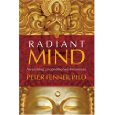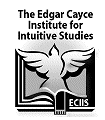| Edited by HENRY REED, Ph.D. |
November 15, 2008 |

|
Front Page |
The Radiant Mind: Awakening to Unconditional Awareness
By Peter Fenner
Summary by Patricia A. Snell, Atlantic University
A radiant mind is one filled with unconditioned awareness. It is a nondual experience. In a nondual experience nothing is left out of the experience. There is no other experience happening at the same time. While we are aware of our surroundings we are not disturbed by our surroundings. We are in a state of conscious being, but without the limitations of time and space.
How can we reach this state of consciousness?
How can we reach this state of consciousness? It takes practice, but we are all capable of reaching this level of awareness. During the experience there are no parameters to limit us in any way. However, before we enter into this state of conscious being, and after we return from it, we can attempt to measure the experience by three parameters. These parameters are purity, depth, and duration. How long did the awareness last? How deep into our conscious being did we go? And while in that state how pure was our experience?
Desirability of this state of consciousness
Time and space limits us. Beyond time and space there is a whole world to explore. It is eternal and boundless, as we are eternal. It is in our ultimate nature not to be bound by time and space. The more we practice being in a state of radiant awareness the easier it will be to reach this heightened awareness. We will be able to go deeper and deeper into new levels of consciousness.
Healing Power
While in the state of radiant awareness it is possible to create a healing situation. We can create the power internally and externally to heal all manner of diseases and discomforts. However, the healing can take many forms.
It could be a simple awareness of the problem and disinterest in it so that, for us and for that time frame, the problem ceases to exist. Although we are aware of the problem it no longer has an effect upon us. For example, we will not feel any pain that is normally associated with the problem.
While in the state of radiant awareness we may also create a feeling of joyful peace and acceptance, eliminating our fears and fixations, which can lead to physical healing.
How do we Start
Our method will be to encourage an unconditioned awareness while remaining fully aware of our daily obligations to self and to each other. Once we have that thought in mind we can proceed to perform exercises to help heighten our awareness. We begin by writing down any experiences of unconditional awareness that we may already have experienced. We should note the purity, depth, and duration of those experiences. That will give us the basis from which we may proceed.
Phases
We go through phases of growth and not all of us go through the same phases. Five major phases have been identified before we reach the phase called Radiant Mind. These phases are Disconnection, Conflict, Codependence, Coexistence, and Paradox. Within these major phases are what might be called mini-phases.
For example, in the Disconnection phase most people are afraid of either the world or of themselves so they will attempt to retreat from the one into the other. If it is the world that we fear we will see shadows following us and will feel a need to protect both our selves and our beliefs. Other points of view are not tolerated.
If we are afraid of ourselves, then we will try to lose ourselves by staying out in the world. We will overwork ourselves at the office and/or pursue impossible goals. Even a simple matter such as changing an appointment is not allowed. We must be able to do it all. Once we recognize this phase of disconnection we can move forward.
During the conflict phase we may still be wary of shadows, but we are entering into a period of expansion. Our desire for increased awareness will cause conflict when we realize we need to listen to other points of view. We want to keep our limited beliefs and will try to find problems with the beliefs of others. At the same time we will be judging ourselves. Are we right? Are we wrong? We even torment ourselves asking if we are doing what we were meant to do. We berate ourselves. There is never enough time to do all we are supposed to do. Or, conversely we may feel there is never enough time to do it all. Eventually though we can work our way through this conflict and grow.
The codependence phase can be a reaction to both the disconnection and the conflict phases. Now we must have people around us. We begin clinging to them. We are moving forward but feel that we need their approval as confirmation that we really are moving forward. Time takes on a new urgency. Everything needs to be organized. Even our movements can become more precise. But as we progress, we will become more relaxed.
In the coexistence phase we realize that we cannot be codependent on others. We must be able to mutually coexist with others. As we become more relaxed with ourselves, our personal and professional relationships grow. We no longer see just good and evil. We become more discriminating in our relationships. We still sometimes feel that we must be in charge of everything, but that urge is diminishing. Life is becoming much more rewarding.
The last major phase before radiant mind is paradox. Now we begin to ask ourselves some pretty fundamental questions. Who am I? Why am I here? Do I have a purpose in life? If so, what is that purpose? Our sensitivity to our surroundings, both internally and externally, becomes acute. We wonder what is real. Our awareness is growing so rapidly we question ourselves. Eventually though we will reach the point where we will stop all the questions and simply accept our new awareness of our self and of all that is around us.
Finally we reach the Radiant Mind phase. This is a phase that is difficult to put into words. Many have tried, but few have been able to succeed. To try to analyze this phase is futile. So let’s move forward and discover some of the obstacles we put in our own way in our quest to experience unconditioned awareness.
Obstacles
Our biggest obstacle seems to be our attitude toward suffering. Something must be wrong if we are suffering and having problems. At times we try to hide our problems and act a though they don’t exist. At other times we seem to enjoy suffering and will complain to anyone within hearing.
Another obstacle is that we so often feel a need to be active. We feel a need to be constantly doing something.
A third obstacle is our need to know. We often feel a need to know more about an infinite number of subjects – a new language; a new product line at the office; what is the dress code for an upcoming social event; or even what will happen next week. We can really get frustrated when we realize we cannot know the future.
We want our lives to have meaning and have a difficult time accepting ourselves ‘as is’. In unconditional awareness there are no obstacles. There is no structure to unconditional awareness. Therefore what can obstruct it?
Contemplation
Should we practice contemplation? Is this necessary to feel fulfilled? Do we really need to change in order to feel fulfilled? The nondual approach teaches that we already have enlightenment. Enlightenment is our natural state of being. Contemplation should be a means of putting aside outside influences so that we may be in our natural state of enlightenment.
Natural contemplation is a way of living our lives with a feeling of serenity. We are able to communicate with others in a straightforward manner with clarity of thought. The more we contemplate in a natural way the more we will invite unconditional awareness into our daily lives.
We cannot allow ourselves to think that sitting in quiet contemplation is a time waster. Contemplation, whether we are sitting or working busily at the office, is essential to being in a state of unconditioned awareness. Sitting simply quiets the busyness of our lives. We should look upon these quiet moments as training for the ability to be in unconditional awareness at any and all times of the day.
Natural Release
Natural contemplation will help to release negative thoughts and emotions. Without contemplation we may be more inclined to dwell on these negative thoughts and emotions, thereby helping them to become a negative influence in our lives. Our goal is to feel complete as we are. Conversely we should also release the desire to hold on to pleasant experiences. This could also indicate a lack of completeness. When in the state of unconditioned awareness we should not feel the need for anything. If we have a need we are incomplete.
Fixations
Fixations are fixed opinions of ourselves and those around us. Are we the way we should be? Do we need to change in some way? Do others around us need to change? How do we perceive the world around us? If we perceive a need we are incomplete. We have core fixations, spiritual fixations, and even fixations about fixations. But in the nondual approach it doesn’t matter. We don’t need to fix our fixations. We should acknowledge that they exist, but then it is enough to only observe them.
How do we observe fixations? Radiant Mind lists many ways we can recognize them.
Nondual Communication
In nondual communication we do not listen in either a positive or a negative way. Instead we engage in pure listening. We neither add to nor take away from what is being said. We simply listen and observe. The result is that we hear everything. With practice we can learn to speak in a like manner. Don’t be surprised if your communications with others include periods of silence. This is the nondual signature. However we will communicate the essence of what is important at that moment.
Love is an essential part of unconditioned awareness. When you engage in pure listening and pure speaking you disengage yourself from emotions. The person with whom you are communicating becomes your reality. That person becomes everything to you in that moment in time.
In the Union of Love and Wisdom (a Buddhist term) we totally identify with another’s experience, while at the same time we completely disidentify with their experience. We must let go of the need to understand. “With wisdom I see that I am nothing; with love I see that I am everything. And between these two my life turns.” (Nisargadatta, Indian nondual sage)
The Here and Now
To be in the Here and Now we cannot fear the future or worry abut the past. Guilt, worry, and anxiety have no part in unconditioned awareness. Remember, with unconditioned awareness we have no needs. There will be times when daily experiences are incomplete. For example, we may forget to make an important phone call and action must be taken to correct the situation. These experiences, both positive and negative will happen. That is a part of life. Incompleteness is the result but there are ways to achieve completeness. Radiant Mind once again gives many examples and exercises.
Deconstructing Fixations
Fixations can be reduced or eliminated. Conversations we have with ourselves or with others can be structured in such as way as to change our way of thinking. Once we recognize a fixation and change the way we think of that particular fixation we can quickly lessen its effect upon ourselves.
Koans, often associated with Zen Buddhism, are puzzles or questions that have no conceptual solution. Koans ask questions such as who am I or what is this. These questions are not meant to be answered. They are designed to lead us into a comfortable state of relaxed silence. Nondual awareness is at its best when there is nothing to say or do and we are simply allowed to relax in a state of unconditioned awareness.
Broadening the River of Life
Silence alone is not our goal with nondual awareness. Restful silence simply helps us to eliminate our fixations and ease us into a state of unconditioned awareness. A state of unconditioned awareness should heighten our human experience. It accepts all that is being presented and rejects nothing. We are aware of all that is happening around us. We are able to more fully enjoy pleasure and endure pain. We are able to accept what life is offering us while at the same time not accepting that life has nothing more to give us.
Problems are a normal part of life. They will always be with us. How we accept our problems is indicative of whether or not we are in a state of nondual awareness. When we accept pain without resistance it is possible for us to experience bliss. Bliss, in turn, can help us to heal emotionally, mentally, and physically. Even working with death can produce nondual awareness. Death can be the ultimate practice of letting go.
Serenity and Seeing Through
In nondual practice we are able to experience thoughts and feelings. However, nondual awareness allows us to ‘see through’ these thoughts and feelings. As long as they do not create a ‘need’ within us we will be able to remain in a serene relaxed state of unconditioned awareness. When we actively practice a state of being serene we are slowing down our thinking and thinning out our thoughts. We have a tendency to try to over process our thoughts. By restricting feedback, whether positive or negative, we are deconstructing or dissolving our fixations.
Deconstructive Conversations
It can be important to know if we really are in a state of nondual awareness. There are several ways we can check ourselves. One way is to simply ask ourselves certain questions such as, Can we enhance this experience; or, is there anything we need to do at this moment. If the answer to either question is yes then we are still in a constructive state.
Once again, there are many exercises included to help us as we travel along to unconditioned awareness.
Conclusion
Radiant Mind is helping us to do away with ego and is helping to pull self into the physical. Ego is of the physical world and can experience the full range of human emotion. Self is not of this world. It is unconscious or spiritual. It does not experience physical pain or joy. It is aware that pain and joy exist in the physical world, but cannot experience it.
Ego is judgmental. Self is nonjudgmental. Ego is constantly looking for new experiences, new emotions. Self is an observer only. It is fully aware at all times, but does not experience the full range of human emotions. Ego is constantly in need of something. Self is one with the Universe and needs nothing. To have nondual awareness ego must be lessened and self must be brought forward into conscious reality. There must be a balance between ego and self. As we come more into balance the result will be more loving kindness toward ourselves and each other. It is possible to live in a state of unconditioned awareness. It is possible to have a Radiant Mind.
To buy this book from Amazon.com, click here!




